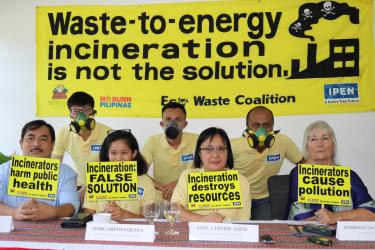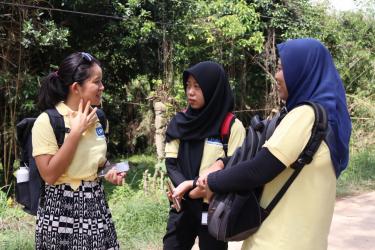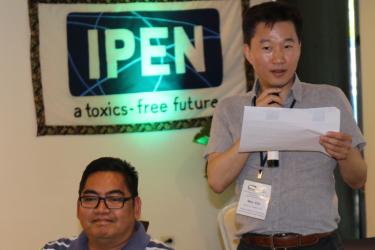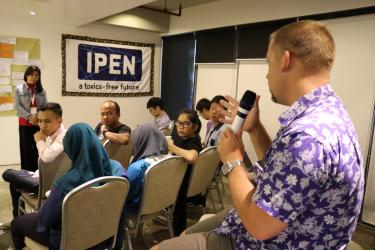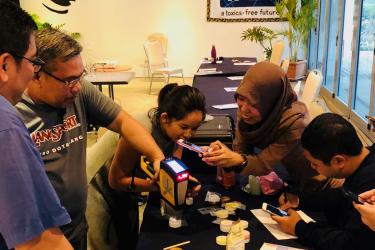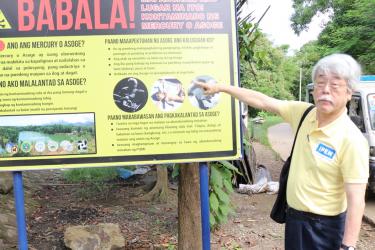IPEN Regional Meeting for Southeast & East Asia
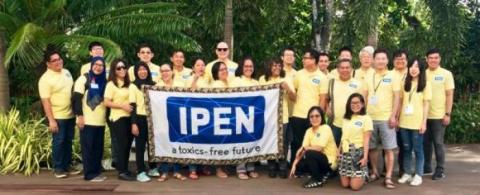
IPEN held a Regional Meeting from 4 - 6 June, 2018 in Puerto Princesa City, Philippines for its Southeast & East Asia regions. Approximately 30 participants from 16 IPEN Participating Organizations (POs) and 2 observer NGOs, from 10 countries, attended the meeting. Find the full program here.
The overall goal of the meeting was to enhance collaboration among IPEN POs in the region and maximize knowledge exchange around different environmental health and chemical safety issues and strategies.
“I think the concept of the meeting was very inspiring. I learned a lot and I’ve been encouraged to do something new back in China,” said Mao Da from Nature University, an IPEN Participating Organization in China.
Success stories
Discussions centered on different successful strategies utilized by IPEN Participating Organizations (POs) in confronting a range of toxics issues such as lead in paint, waste-to-energy (WtE) facilities, pesticides, chemicals in products, mercury contamination in artisanal small-scale gold mining sites, chemical poisoning in the electronics industry, Minamata disease, and cadmium contamination.
Policy advocacy, legal case filing, monitoring of polluted resources and areas to generate evidence for action, public communication through multi-media and social media were among the strategies highlighted resulting to concrete victories or milestones around the above-mentioned issues.
“I’m glad to hear about various kinds of activities and achievements. For example, the lead paint elimination project is very intensive. In Korea, the regulation limiting lead in paint is 600 ppm—about seven times higher than that of the Philippines. We Korean NGOs must consider this situation and should take some action to lower the lead content limit in paints regardless of its usage,” declared Won Kim, Director for Research at the Wonjin Institute for Occupational & Environmental Health, an IPEN PO in South Korea.
Policy update and technical input
There was policy and technical input on various topics during the meeting. Joe DiGangi, IPEN Senior Science and Technical Advisor gave updates on international chemical safety agreements including the Stockholm, Basel, Rotterdam, and Minamata conventions and SAICM. He also provided possible actions that POs could take at the national level to help strengthen IPEN’s international policy engagement on the agreements.
IPEN’s Mercury and POPs Policy Advisor, Lee Bell, spoke about waste incineration and non-combustion alternatives for POPs waste. This was particularly relevant as the proliferation of waste-to-energy facilities is a major concern of many IPEN POs in China, Indonesia, Malaysia, Philippines, Taiwan, Thailand, and Vietnam.
IPEN PO Survey and 2020 Agenda
Also presented during the meeting was the regional results of the 2017 IPEN PO survey. Priority issues and work areas of POs in the region, their needs and expertise, felt benefits of being in IPEN, and POs’ recommendations for IPEN were discussed.
IPEN’s 2020 goals from its 5-year strategic plan were presented to the group by the founding Regional Coordinator, former IPEN Co-Chair and 2018 Goldman Prize Awardee, Manny Calonzo. IPEN’s main areas of work, including outcomes IPEN wants to achieve by 2020, were discussed. It was also clarified that the strategic plan was formulated based on the results of the previous global PO survey conducted in 2014.
Raising resources
Bjorn Beeler, IPEN’s International Coordinator, gave a presentation about the key steps to mobilizing resources for chemical safety and environmental health.
Atty. Jun Quicho, the Philippine country manager of the GEF-Small Grants Programme, gave an overview about the SGP, shared in which countries in southeast and east Asia the program is present, the focal areas or themes supported by the program and encouraged the participants to maximize and access resources from the program.
Ways forward
The regional meeting ended with a planning session to identify priority actions the group wanted to pursue as a regional network.
During the planning session, it was revealed that there are a lot of resources in the region that could be tapped by the network. For instance, there are 3 available XRF machines in the region, a laboratory in South Korea operated by an IPEN PO that could test the presence of endocrine disrupting chemicals, various studies on industrial sites, ASGM hotspots, chemicals in products, and so on.
Thony Dizon of EcoWaste Coalition from the Philippines said,“let us maximize the available equipment, talents, and expertise in the region and share with one another and activate the listserve or any other medium for information exchange.”
Among the regional strategic actions identified by the group that would help strengthen the POs’ national level work are: to document, share and popularize success stories of POs; create and share database of resources within the region; explore regional platforms for regional level advocacy around the issues of lead in paint, WtE and microplastics; conduct regional studies on heavy metals in rice and mercury mines across the region; strengthen national level actions to ratify and/or implement the chemical treaties; and have regular regional level skills-sharing and discussion around different topics and issues through webinars and other modes of sharing.
“We can use IPEN’s work—scientific information, studies, and researches—in our own countries to effect change and we can help a lot if we work together,” declared Akarapon Teebthaisong of EARTH, an IPEN PO based Thailand.
Other Highlights
Visit to a Mercury-Contaminated Site
The participants of the regional meeting went on an exposure trip to Sta. Lourdes, a mercury-contaminated village within the city. A mercury mining company operated in the area in the ‘60s and exported mercury to Japan.A recent government study found mercury poisoning in a majority of the residents tested with some community members exhibiting symptoms of Minamata disease.
The participants were able to dialogue with community members who revealed their doubts about the results of the government study and the real intention of the government to rehabilitate the area. Read the press release here.
After the site visit, Angus Ho of Greeners Action in Hongkong said, “the situation in the community is, unfortunately, typical of contaminated sites in other areas. There is lack of community awareness of the harm befalling them, distrust in government and insufficient efforts to protect the community from harm to toxic exposure.”
Tani Yoichi of Collaboration Center for Minamata Disease Victims, meanwhile said, “I will try to organize a fact-finding visit of my colleagues in Japan to this area, and perhaps also arrange for some community members and NGOs here in Palawan to go see the situation in Minamata.”
Say no to waste-to-energy facilities
A press conference was also held to commemorate World Environment Day and lend support to the local struggle against a Waste to Energy facility, which is planned to be built in the city. The panelists at the press event were IPEN Senior Advisor Mariann Lloyd-Smith, PhD (Law); Atty. Gerthie Mayo-Anda, head of a local NGO; lawyer Margaretha Quina of the Indonesian Center for Environmental Law; and, Ruel Cabile representing the national coalition, No Burn Pilipinas. The speakers shed light on the pitfalls of incinerating waste from environmental, health and socio-economic perspectives.
Film showing of “Stories from the Clean Room”
The South Korean film “Stories from the Clean Room” was screened during the meeting. The film viewing was capped by a spontaneous show of solidarity by the participants who made posters with messages of support for SHARPS.
XRF testing
EcoWaste Coalition brought its XRF analyzer to the meeting and conducted screenings to detect mercury and other heavy metals in facial creams brought by Indonesian colleagues.
___________________
EcoWaste Coalition has been serving as IPEN’ Southeast and East Asia Regional Hub since 2017. The IPEN SEA Region includes Cambodia, China, Indonesia, Japan, Malaysia, Philippines, South Korea, Taiwan, Thailand, and Vietnam. For more information, contact Lia Jasmin M. Esquillo, IPEN SEA Regional Coordinator at lesquillo@ecowastecoalition.org.

